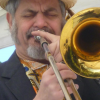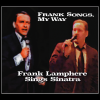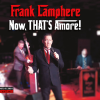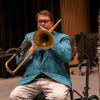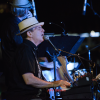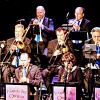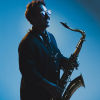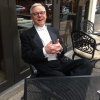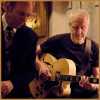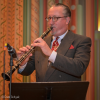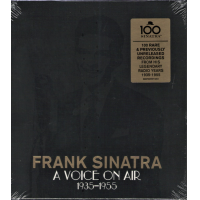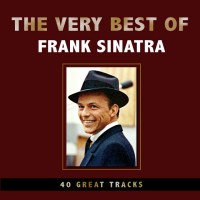Home » Jazz Musicians » Frank Sinatra
Frank Sinatra
Francis Albert Sinatra was an American singer who is considered one of the finest vocalists of all time, renowned for his impeccable phrasing and timing. Many critics place him alongside Bing Crosby, Elvis Presley and The Beatles as one of the most important popular music figures of the 20th century.
Sinatra launched a second career as a dramatic film actor, and became admired for a screen persona distinctly tougher than his smooth singing style. Sinatra also had a larger-than-life presence in the public eye, and as "The Chairman of the Board" became an American icon, known for his brash, sometimes swaggering attitude, as embodied by his signature song "My Way".
He was born in Hoboken, New Jersey. He was the only child of a quiet Sicilian fireman father, Anthony Martin Sinatra (1894-1969). Anthony had emigrated to the United States in 1895. His mother, Natalie Della Gavarante (1896-1977), was a talented, tempestuous Ligurian, who worked as a part-time abortionist. She was known as "Dolly", and emigrated in 1897. Although it is part of the Sinatra folklore that Frank had an impoverished childhood, he was actually brought up in middle-class surroundings, due to his father's secure job as a fireman, and his mother's strong political ties in Hoboken.
Frank Sinatra decided to become a singer after hearing Bing Crosby on the radio. He began singing in small clubs in New Jersey and eventually attracted the attention of trumpeter and band-leader Harry James.
After a brief stint with James, he joined the Tommy Dorsey Orchestra in 1940 where he rose to fame as a singer. His vast appeal to the "bobby soxers", as teenage girls were called, revealed a whole new audience for popular music, which had appealed mainly to adults up to that time. It was as a featured singer with Dorsey that Sinatra made his earliest film appearances, such as the 1942 Eleanor Powell/Red Skelton comedy, ''Ship Ahoy'' in which the uncredited singer performed a couple of songs.He later signed with Columbia Records as a solo artist with some success, particularly during the musicians' recording strikes. Vocalists were not part of the musician union and were allowed to record during the ban by using ''a capella'' vocal backing. Sinatra's singing career was in decline in the late 1940s and early 1950s. Sinatra had begun appearing in movies in the early 1940s, but usually in musicals, often undistinguished ones. He also appeared on a weekly television show on CBS for two years from 1950-1952 (and would try again for one year on ABC from 1957-1958). Sinatra then launched a second career as a full-fledged dramatic actor by playing scrappy Pvt. Angelo Maggio in eve-of-Pearl Harbor drama ''From Here to Eternity'' (1953), for which he won a Best Supporting Actor Academy Award. This role and performance became legendary at the time as the key comeback moment in Sinatra's career.
Read moreTags
Eight Sinatra Surprises

by David Bittinger
Frank Sinatra and Ella Fitzgerald were mutual fans who joined up for superb duets and had similar repertoires. Is it possible to call one of them primarily a “jazz singer" and one not? Yeah, it's possible. Listen to Ella scat on How High The Moon and you hear a genius singer who came from jazz territory and could riff like an instrumentalist. Frank really wasn't a jazz singer and had just one little joke scat, “dooby dooby doo," ...
Continue ReadingSinatra In The Studio

by Bill Gottlieb
This article was first published at All About Jazz in December 1998. Back in 1947, I covered, for kicks, a Frank Sinatra Columbia record date, produced in New York at Liederkranz Hall. There was an acoustically superb studio large enough to handle the sumptuous, full-fiddle orchestra assembled by Axel Stordahl, the leader and arranger. In the band were many of the city's top studio musicians, a stimulating sight. Dominating the scene was Sinatra, the one-time ...
Continue ReadingThe Rat Pack vs. the Kids in the Kitchen: Are Those Our Only Choices?

by Con Chapman
It was a more important anniversary than most so we decided to splurge on a local restaurant that always gives me buyer's remorse when I get the check. My wife and I are both getting up in years and we eat out at what she used to jokingly refer to as “blue hair hours," when you can get the early-bird special if you want. In that time slot the crowd consists of senior citizen guys and their wives, ...
Continue ReadingFrank Sinatra: The Capitol Records Albums, 1954 to 1959

by Dan McClenaghan
After stints in the Harry James and Tommy Dorsey bands, Frank Sinatra began his solo recording career in 1947 with Columbia Records. This association lasted until 1950. He switched labels in 1954, moving on to Capitol Records. Songs For Swingin' Lovers (Capitol, 1954) was his first release for the label. It was the beginning of an unparalleled output of excellence in recorded music. Nobody has done it better. He stayed with Capitol until 1961 when he started his own label, ...
Continue ReadingFrank Sinatra: Sing and Dance with Frank Sinatra

by Nicholas F. Mondello
Sing and Dance with Frank Sinatra is without question a recording achievement of importance and historical magnitude. Producers Charles L. Granata and Andreas Meyer have delivered an experience that sources and reconstitutes important Sinatra mid-20th Century material. It will fascinate Sinatraphiles and enlighten those interested in “The Voice's" artistic development from crooner to swing icon. Included in the album are eight Great American Songbook classics that Sinatra recorded for Columbia Records circa 1950 with swinging big bands. Those ...
Continue ReadingFrank Sinatra: Myth, Reality and a Critic Standing in Line at Arby’s

by S.G Provizer
The mere act of re-releasing a 1960 Frank Sinatra album speaks to the fact that his name still creates ripples when tossed into the cultural pond; still has the power to inspire a reaction when other other vocal stars of yore have receded into distant memory. An ocean of ink has been spilled in portraits and musical criticism of the “Chairman of the Board," some of it merely respectful, most adulatory. Long ago, the rough, mafia-inflected edges were smoothed out ...
Continue ReadingChuck Granata: On Sinatra, The Beach Boys, and Johnny Mandel

by Nicholas F. Mondello
Chuck Granata is a record and radio producer, author, music historian and archivist. He has written four books on music and sound recording: Sessions with Sinatra: Frank Sinatra and the Art of Recording (Chicago Review Press, A Capella Books, 1999), Wouldn't it be Nice: Brian Wilson and the Making of the Beach Boys' Pet Sounds (Chicago Review Press, A Capella Books, 2003), Making Records: The Scenes Behind the Music (with legendary record producer Phil Ramone) (Hyperion Press, 2007) and the ...
Continue ReadingUMe To Release New Frank Sinatra Double Vinyl Set ‘The Giants Of Jazz’
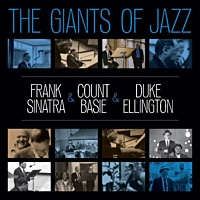
Source:
Universal Music Enterprises
INCLUDES RARE PHOTOS & ORIGINAL ARTWORK UMe, in conjunction with Frank Sinatra Enterprises, announces a new exclusive double-vinyl collection from Frank Sinatra, featuring his historic collaborations with Count Basie and Duke Ellington, entitled The Giants Of Jazz, out September 26, 2025. This special release includes a pair of timeless albums—It Might As Well Be Swing with Count Basie and His Orchestra and Francis A. & Edward K. with Duke Ellington—newly remastered from the archival recordings. The package includes a new ...
read more
Perfection: Frank Sinatra - There's a Small Hotel

Source:
JazzWax by Marc Myers
Readers often ask me for my favorite Frank Sinatra track and arrangement from the singer's Capitol years (1953-1962). While I can't tell you which is No. 1 on my list—there are simply too many great ones—I can tell you which recording is in my top 3: There's a Small Hotel. For the film Pal Joey (1957), which starred Rita Hayworth, Kim Novak and Sinatra, Nelson Riddle arranged the Rodgers and Hart songs—The Lady Is a Tramp, I Didn't Know What ...
read more
Just Announced: More Artists Added To Star-studded Celebration Of Peggy Lee And Frank Sinatra In Newark on February 8th

Source:
AMT Public Relations
Thursday, February 8, 2024 @ 7:30 p.m. New Jersey Performing Arts Center 1 Center Street Newark, New NJ 07102 $49-$99. To purchase, contact NJPAC at 1.888.GO.NJPAC / 1.888.466.5722 or visit NJPAC.org. The New Jersey Performing Arts Center (NJPAC) celebrates the close friendship of legendary singer and songwriter Miss Peggy Lee and the greatest vocal star of all, Frank Sinatra. This one-night-only event on Thursday, February 8, 2024, features Christian McBride as Musical Director, with a lineup of ...
read more
Frank Sinatra and Ernie Freeman

Source:
JazzWax by Marc Myers
As I recall growing up in Manhattan in the mid-1960s, the Beatles were only big in bedrooms. Kids listened to Fab Four 45s on their portable phonographs sitting on the floor next to their beds or heard the group on AM radios under their pillows. Outside the bedroom, in the world I encountered—the living rooms of friends' apartments, barber shops and distant open windows—what I heard most was Frank Sinatra. Albums were still an adult purchase, and even in the ...
read more
Frank Sinatra on Film: 1942-'51

Source:
JazzWax by Marc Myers
Let's end the week with clips of Frank Sinatra singing in films between 1942 and 1951, when he was still idolized by women and before middle-aged men stole him away in the mid-1950s: Here's Sinatra singing Poor You from Ship Ahoy in 1942 with the Tommy Dorsey Orchestra... Here's Sinatra singing The Music Stopped from Higher and Higher in 1943... Here's Sinatra, again from A Lovely Way to Spend an Evening... Here's Sinatra and Gloria DeHaven singing Come Out, Come ...
read more
Roger Moore and Sinatra

Source:
JazzWax by Marc Myers
Roger Moore, who played a dashing secret agent in TV's The Saint and in seven James Bond films, died on May 23, 2017. He was 89. Though Roger wasn't a jazz musician and had nothing to do with music (the point of this blog), I had an opportunity to interview him for one of my Wall Street Journal “Playlist" columns. When I called Roger in late 2014 to do the interview, he was living (naturally) in Monaco. Just saying Monaco ...
read more
Sinatra: Strangers in the Night 2

Source:
JazzWax by Marc Myers
Yesterday, I posted about Frank Sinatra's single, Strangers in the Night, which went to No. 1 on Billboard's Hot 100 chart this week in 1966. I also included a link to my Wall Street Journal essay on the song and album. Included in yesterday's post was my complete interview with Jimmy Bowen, who produced the single and shed some light on why Sinatra wasn't crazy about the song and why he avoided it in future concerts. Today, I want to ...
read more
Sinatra on TV: The DVDs

Source:
JazzWax by Marc Myers
It's easy to forget how many TV specials Frank Sinatra taped over the decades. Let's just say it's dozens. A glance at his entry at IMBD.com can make your head spin. There are the ones you know, ones you don't and ones that you'd love to see in full if you could, like The Frank Sinatra Timex Show: Welcome Home, Elvis! (1960). (Actually, to view it, go here.) Now, Eagle Rock Entertainment has released four separate DVDs that collectively feature ...
read more
Sinatra on TV in '65

Source:
JazzWax by Marc Myers
As years go, 1965 marked a significant cultural turning point. With teen audiences screaming at concerts for the Beatles and the Supremes, pop-rock and soul began to lock up a sizable slice of the record market. At the exact same time, the future was becoming a national obsession, helped along largely by the space race and moon shot. Jet travel, the Houston Astrodome, the New York World's Fair, muscle cars, California, futuristic children's cartoons and ads for products like Tang, ...
read more
New England Conservatory Presents Too Marvelous For Words: Music Of Frank Sinatra

Source:
Braithwaite & Katz Communications
Thursday, October 15 at 7:30 p.m. New England Conservatory presents Too Marvelous for Words: Music of Frank Sinatra, a concert to celebrate the 100th anniversary of Frank Sinatra’s birth at 7:30 p.m. on Thursday, October 15. The event, conducted by Jazz Studies Chair Ken Schaphorst, will feature the NEC Jazz Orchestra and student vocalists with the NEC Philharmonia String Section. Included on the program are many of the most famous arrangements associated with Sinatra such as Nelson Riddle’s arrangements of ...
read more

 Sinatra resumed his strong film work with the 1962 paranoid classic "The Manchurian Candidate," in which he plays the troubled, frequently blinking, but nonetheless resolute protagonist. In 1965's "Von Ryan's Express," Sinatra added dimensionality to a World War II action role. Other film appearances during this time were either cameos or, as in the case of 1964's "Robin and the Seven Hoods," critically-panned efforts to trade in on his image.In the 1970s Sinatra staged a retirement and several comebacks, recording less frequently but continuing to perform in Las Vegas and around the world.In 1981 Sinatra's Nevada casino license was reinstated after hearings by the Nevada Gaming Control Board. Indeed, journalist Pete Hamill wrote in his book, "Why Sinatra Matters," that Sinatra was "the most investigated American performer since John Wilkes Booth." "Sure, I knew some of those guys," Sinatra himself said. "I spent a lot of time in saloons. And saloons are not run by the Christian Brothers. There were a lot of guys around, and they came out of Prohibition, and they ran pretty good saloons. I was a kid. I worked in the places that were open. They paid you, and the checks didn't bounce. I didn't meet any Nobel Prize winners in saloons. But if Francis of Assisi was a singer and worked in saloons, he would've met the same guys."In 1986, investigative journalist Kitty Kelley published a biography of Sinatra entitled ''His Way: The Unauthorized Biography of Frank Sinatra''. Sinatra went to court to try to prevent it from being published, bring a $2 million lawsuit against her because he believed that the book painted him in an unattractive light, and he accused her of misrepresenting herself as his authorized biographer. He later withdrew his lawsuit amid much publicity and the book went on to become number one on the ''New York Times'' best seller list and was a huge seller not only in the US but also in England, Canada, and Australia. Another Sinatra nemesis, the Hollywood gossip columnist Rona Barrett, came closer to a depiction of his character in her roman a clef, "The Lovo-maniacs," which attempted a fictional insight into his complex personality. Sinatra's singing career continued into the 1990s, most notably with his commercially-successful ''Duets'' albums on which he sang with other stars such as U2's Bono. He continued to perform live until February 1995, but the nearly 80-year-old singer often had to rely on teleprompters for his lyrics, to compensate for his failing memory.
Sinatra resumed his strong film work with the 1962 paranoid classic "The Manchurian Candidate," in which he plays the troubled, frequently blinking, but nonetheless resolute protagonist. In 1965's "Von Ryan's Express," Sinatra added dimensionality to a World War II action role. Other film appearances during this time were either cameos or, as in the case of 1964's "Robin and the Seven Hoods," critically-panned efforts to trade in on his image.In the 1970s Sinatra staged a retirement and several comebacks, recording less frequently but continuing to perform in Las Vegas and around the world.In 1981 Sinatra's Nevada casino license was reinstated after hearings by the Nevada Gaming Control Board. Indeed, journalist Pete Hamill wrote in his book, "Why Sinatra Matters," that Sinatra was "the most investigated American performer since John Wilkes Booth." "Sure, I knew some of those guys," Sinatra himself said. "I spent a lot of time in saloons. And saloons are not run by the Christian Brothers. There were a lot of guys around, and they came out of Prohibition, and they ran pretty good saloons. I was a kid. I worked in the places that were open. They paid you, and the checks didn't bounce. I didn't meet any Nobel Prize winners in saloons. But if Francis of Assisi was a singer and worked in saloons, he would've met the same guys."In 1986, investigative journalist Kitty Kelley published a biography of Sinatra entitled ''His Way: The Unauthorized Biography of Frank Sinatra''. Sinatra went to court to try to prevent it from being published, bring a $2 million lawsuit against her because he believed that the book painted him in an unattractive light, and he accused her of misrepresenting herself as his authorized biographer. He later withdrew his lawsuit amid much publicity and the book went on to become number one on the ''New York Times'' best seller list and was a huge seller not only in the US but also in England, Canada, and Australia. Another Sinatra nemesis, the Hollywood gossip columnist Rona Barrett, came closer to a depiction of his character in her roman a clef, "The Lovo-maniacs," which attempted a fictional insight into his complex personality. Sinatra's singing career continued into the 1990s, most notably with his commercially-successful ''Duets'' albums on which he sang with other stars such as U2's Bono. He continued to perform live until February 1995, but the nearly 80-year-old singer often had to rely on teleprompters for his lyrics, to compensate for his failing memory.


